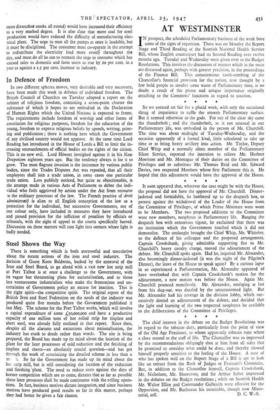In Defence of Freedom
In two different spheres moves, very desirable and very necessary, have been made this week in defence of individual freedom. The British Council of Churches on Tuesday adopted a report on the subject pf religious freedom, containing a seven-point charter the substance of which it hopes to see embodied in the Declaration of Human Rights which the United Nations is expected to frame. The requirements include freedom of worship and other forms of association for religious purposes, freedom for the education of the young, freedom to express religious beliefs by speech, writing, print- ing and publication ; there is nothing here which the Government of any civilised country would not approve. At the same tithe Lord Reading has introduced in the House of Lords a Bill to limit the in- creasing encroachments of official bodies on the rights of the citizen. This is no new evil. Lord Hewart inveighed against it in his New Despotism eighteen years ago. But the tendency always is for it to grow. The most flagrant invasion is the insistence by various public bodies, since the Trades Disputes Act was repealed, that all their employees shall join a trade union, in some cases one particular trade union. Less publicly noticed, but quite as objectionable, is the attempt made in various Acts of Parliament to debar the indi- vidual who feels aggrieved by action under the Act from recourse to the ordinary processes of the law. The French practice of droit idministratif is alien to all English conception of the law as a protection for the individual, but successive Governments, not of one colour only, have included in measures they have introduced and passed provision for the infliction of penalties by officials or tribunals, with the right of appeal to the courts specifically barred. Discussion on these matters will cast light into corners where light is badly needed.


































 Previous page
Previous page